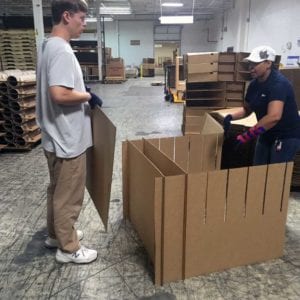Imagine in your city a tightly connected community of social service providers, government leaders, parents, employers, and small business owners all driven by a mission of helping autistic adults be successful and independent in a world that more often than not rejects them.
In the 1960s, we had the civil rights movement for blacks. In the 1970s, we saw the rise of feminism for women. Then in the 1990s, we saw the start of the gay-rights movement. How about the “neurodiversity movement” being the movement of today?
That was the message of John Elder Robison, Neurodiversity Scholar in Residence at the College of William and Mary, speaking at the South Carolina Autism Society Conference Nov. 4.

Robison
According to Robison, “neurodiversity is the idea that neurological differences like autism and ADHD are the result of normal, natural variation in the human genome. This represents new and fundamentally different way of looking at conditions that were traditionally pathological. It’s a viewpoint that is not universally accepted though it is increasingly supported by science.” In other words, the one in 68 births today of an infant with autism is because God made them that way.
At age 59, Robison was born with higher functioning autism or Asperger’s at a time when no one really recognized it as a disability. He rose through a difficult childhood to being a successful entrepreneur and now a leading advocate and speaker for autism. Robison pleaded with those attending the conference to go forth and “own” autism in their communities. With so many challenges, including unemployment rates as high as 90%, multiple diagnoses such as depression and anxiety, and obtaining permanent housing; we need to join forces to help autistic adults. (FYI—Robison is just fine using the term autistic in describing himself).
The neurotypical world needs to recognize that while autistic individuals might not make the best hostesses or cashiers, they are especially gifted in the fields of math, engineering and technology. Jobs that require repetition, attention to details or fine motor skills are good fits for someone with autism. We need to advocate for them and help business owners and managers to understand these special skills and how they can complement their workplaces. A young man I coach who works at a family-owned restaurant warms up the place with his gentle nature and ever-present smile.
Robison said the population of the autism community is similar to the Jewish community in the United States. If only the autism community could network, advocate and most of all—HELP ITS PEOPLE—as well as the Jewish community, imagine how much better we would be.
Concerning education, we need to direct more individuals to trade and technical colleges instead of four-year universities. Autistic adults are better suited for careers in these fields than the typical white-collar job that requires a high degree of social interaction and “people skills.”
We need to make a greater effort to understand and help young adults with autism or other intellectual disabilities learn a trade that will help them be independent. Unfortunately, there are less employers and businesses today willing to train people through hands-on apprenticeships than in the old days. Remember Ebenezer Scrooge under the tutorage of Fezziwig in A Christmas Carol?
“We can harness people’s special skills by looking for gifts instead of limitations,” Robison says. “There is so much to be gained for your bottom line, for the autistic person you employ, and for society at large when you hire someone on the (autism) spectrum.”


